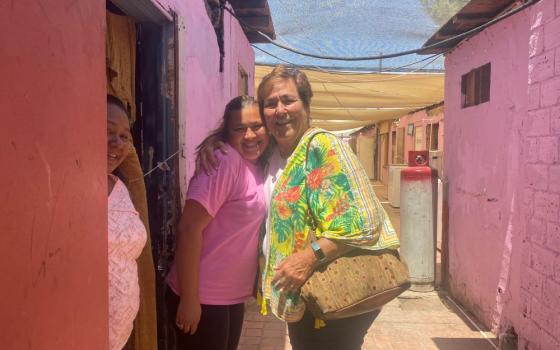
Pope Francis tries on a pair of glasses in an optical store in downtown Rome Sept. 3. Romans and tourists crowded outside the shop to catch a glimpse of the pope inside as he had his eyes measured for a new set of bifocal lenses. (CNS/Chiara Apollonj, Reuters)
Forget about "Frankie goes to Hollywood." Millions of excited Catholics (and battalions of nervous cops and secret service agents) are counting down the final hours until Pope Francis comes to Washington, New York and Philadelphia.
And many pundits who earn their bread and butter by tracking the whirlwind pontificate of the only Latin American and the first-ever Jesuit pope have put people on notice: be prepared for surprises.
Anyone who has been paying attention these past couple of years knows Francis routinely goes off script and regularly turns carefully prepared protocols on their head. But more often than not these seemingly spontaneous gestures or impromptu remarks are actually quite intentional and part of the pope's own carefully planned pastoral and communications strategy.
Unfortunately, too many are those who have "eyes and do not see" or "ears and do not hear." And they miss the deeper, perhaps more subtle significance of what the pope is up to.
One of the most recent examples of Francis doing it his way, rather than conforming to expectations of how popes are supposed to discharge their sacred duties, came several days ago when he nipped out of the Vatican early one evening to buy a new pair of eyeglasses.
Aides bundled the 78-year-old pontiff into his favorite blue Ford Focus (you can't make this up) and drove him across the Tiber River to an optical shop in downtown Rome. But it wasn't just any old part of town. It was the swanky Via del Babuino in one of city's smartest shopping areas.
And there, for all to behold, was the pope of the poor and the voice of the peripheries getting new specs right across the street from one of Rome's best-known symbols of luxury, the Hotel de Russie, on the edge of Piazza del Popolo.
As the white-cassocked Francis stepped out of his modest ride, an excited crowd of tourists and Romans who were out for a pre-dinner stroll or to do some window-shopping quickly surrounded him.
"What so strange?" the pope joked. "If you want to change your glasses you go to an optician."
Many have credited Francis with bringing "normality" back to daily life in the Vatican and throughout the church. And, naturally, he acted as if this was the most normal thing in the world.
It would have been if he weren't the pope. Or if he had he gone to a shop on the Borgo Pio or to a more normal and less touristy neighborhood closer to his residence, rather than in the heart of the up-market tourist zone.
And you can be sure that if Benedict XVI had tried this -- he who was teased for wearing red Prada shoes (which he actually did not) and donning chic Serengeti sunglasses (which, yes, he actually did) -- the media would have had him for lunch.
But Francis gets away with lots of things that his German predecessor never could.
And, indeed, there was more to his trip to the eyeglass store than -- excuse the pun -- what meets the eye.
Actually, the optician was supposed to go to the Vatican next day to adjust the Pope's prescription privately in his Santa Marta Residence. But Francis decided he would go to the optical shop, instead.
The gathered crowd watched through the storefront window for the forty or so minutes it took the eye technician to examine his famous patient and fit him with new specs.
There is no doubt that the Pope wanted all of this to be observed and duly noted. Otherwise, he would not have gone at one of the busiest times of the day or without trying to slip by incognito.
No, Francis carefully arranged this seemingly normal outing to make a very important statement.
It came at the beginning of is what is traditionally the end of the Vatican's summer holidays and the beginning of the new work year.
It was just a few days after he announced a special Jubilee initiative to foster greater mercy towards women who have had abortions. And it was only a few days before he changed longstanding Church law to streamline marriage annulments.
Next Saturday he embarks on the high-profile visit to Cuba and the United States and, immediately after his return to Rome, he opens the Synod of Bishops' second session on the family.
The Pope, who will be 79 in December, is also meeting this week with his C9 council of cardinals who are advising him on how to reform the Roman Curia. All these events and the issues pertaining to them are contentious and could be potential pitfalls for the pope.
In short, Francis has just begun perhaps the most intense and pivotal stage in his pontificate up to now.
Interestingly, he told the optician during his recent outing he did not want new frames but only wanted to change the lenses.
By doing that so publicly and with such popular fanfare he was sending an unmistakably clear message to those who have still not embraced the reforming spirit he's trying to instill in the church.
And that message was this: the framework for reform has not changed, but the pope has sharpened his eyesight and will focus with greater clarity to bring forth his vision for a church that takes risks, is poor for the poor and lavishly shows mercy.
Intentionally drawing a crowd outside the eyeglass shop was also meant to send a message -- that even if some professional church people, including bishops, are still lukewarm towards Francis, the people -- at least for now -- are enthusiastically following him.
[Robert Mickens is editor-in-chief of Global Pulse. Since 1986, he has lived in Rome, where he studied theology at the Pontifical Gregorian University before working 11 years at Vatican Radio and then another decade as correspondent for The Tablet of London.]
Editor's note: We can send you an email alert every time Robert Mickens' column, A Roman Observer, is posted. Go to this page and follow directions: Email alert sign-up.




